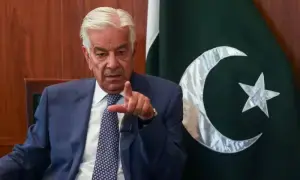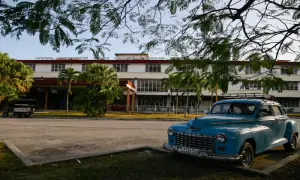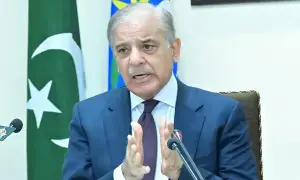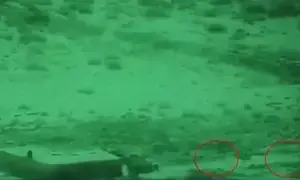Will Lyari gangster Uzair Baloch ever be a free man?
8 min readUzair Baloch, the hero and villain of a gang-war so famous in Karachi that it spawned its own movie, has been freed in three more court cases, leading to speculation that he is inching towards life beyond bars.
He still has a long way to go; while he has been acquitted in close to 20 cases, he was charged in at least 59 cases (with some saying that the figure is even higher). This means that another 40 cases – ranging from narco-trafficking to premeditated murder – still hang over his head. His lawyer Abid Zaman says he is fighting 15 alone.
These legal proceedings are separate from the 12-year conviction awarded to him – in secret - by a military court on charges of spying for Iran in April 2020.

Political pawn
Uzair Baloch has been in the custody of the authorities in Pakistan since January 2016, although he was first arrested in 2014. Local media reported that Uzair was arrested by Interpol while crossing into the UAE from Muscat, Oman. According to those close to him, Uzair owned a house in Muscat.
He mysteriously surfaced in Pakistan in Jan 2016 and was promptly taken into custody. It was reported at that time that Uzair could possibly have been used as a pawn to put pressure on the PPP which was agitating to curtail the powers of the Pakistan Rangers in Sindh province. The paramilitary force has, to this date, continued to receive 90-day extensions on the ‘special powers’ it has been granted for policing in Karachi.

A phenomenal rise
Uzair’s entry into Lyari’s crime world seems inevitable. The 45-year-old was born in Singo Lane, one of the many cramped alleys snaking through the Baloch-dominated Lyari neighbourhood. His uncle was Lyari kingpin Rehman Dakait.
The story goes that Uzair was against the idea of joining Dakait and his group. In 2001, aged 24, Uzair made his first foray into public life: contesting the election for the area nazim but he lost. At that time, it seemed that Uzair wanted to take a different path. But his father’s murder, in 2003, at the hands of Rehman Dakait’s rival gang opened the door to the world of crime. While the facts of the story are undisputed, some have questioned whether it was the murder that was his prime motivation.
Uzair along with Baba Ladla became Rehman Dakait’s go-to men as the group fought in a turf war with the Arshad Pappu group, which is said to have had the support of the MQM. This was a time when the MQM controlled most of Karachi and Lyari was in the dominion of its crime lords.
This made Uzair one of the pivotal characters in the political conflict between the Pakistan Peoples Party, which purportedly supported the Rehman Dakait group, and the MQM. This rivalry often took an ethnic colour with the Baloch pitted against Muhajirs.
The formation of the Peoples Aman Committee in 2008 crystallised PPP support for Rehman Dakait. Dakait’s death in a police encounter in 2009 landed Uzair at the helm.
This was all happening at a time when the PPP, who was ruling in the province and at the Centre, was under pressure to crack down on criminal elements terrorising the city. This included the crime lords of Lyari.

But the same crime lords provided muscle and ensured street legitimacy to the party. They did everything from extortion to assassination. And for this they were feted. PPP leaders would routinely be pictured with Uzair, despite his reputation. He was known to have regular meetings with Zulfikar Mirza and the late Rehman Malik. Reports say that Asif Zardari’s sister Faryal Talpur received money from Uzair.
“In metropolises like Karachi, those with political stakes are likely to patronise criminal networks and gangs,” says criminologist Zoha Waseem. “They have accrued political favours.” Waseem an Assistant Professor at the University of Warwick whose book 'Insecure Guardians: Enforcement, Encounters and everyday Policing in Postcolonial Karachi' will be out soon.
In all of this, Uzair presented himself as a modern day Robin Hood who shared his ill-gotten gains with the people of Lyari. His street cred rose to a point where, according to anecdotal information, he became unacceptable to those holding the reins.
‘Too big for his boots’
Owais Muzaffar, popular known as ‘Tappi’, is Zardari’s foster brother who was a key figure in the PPP till mysteriously falling off the grid around 2017.
In one of his visits to Lyari during 2012, he saw posters of Uzair Baloch all over the area. Tappi was interested in contesting the PPP seat as a candidate from the area. Uzair’s popularity is said to have not gone down well with him. Perhaps posters of Zardari and his late wife Benazir should have adorned the area instead of Uzair's.

Enter (the late) Chaudhry Aslam, a police officer better known for cleaning up ugly messes "by day end". He was tasked with the operation to rid Lyari of the criminal elements and to ‘bring Uzair a notch down’.
The operation failed horribly, resulting in heavy casualties for the police and the gangsters, with Uzair eluding capture. The PPP was castigated for the failure while the PML-N, then their rivals, made overtures to Uzair.
Despite being a wanted criminal, Uzair became untouchable – even when in Karachi. Defying his political 'godfathers' and the full force of the city's law enforcement gave him an air of invincibility.
While his group no longer enjoyed the overt political party patronage, he still was a valuable asset. This wasn’t just true for political parties but also for the ‘Establishment’.
In 2013, Uzair’s rival Arshad Pappu was murdered and a video went viral of his decapitated head being used as a football. This was a chilling message by the Lyari kingpin to his many rivals.
A few months later, a bomb went off during a boxing match at Lyari where Baba Ladla – Uzair’s friend now turned foe – was present. Ladla survived the attack but the attack was construed to be another message from Uzair. Shortly after, Uzair’s close friend and ally Zafar Baloch was killed. Uzair was reportedly arrested by Interpol soon after that.
According to one crime reporter, Uzair was not just an asset with information on politicians. The gangsters of Lyari also served as a bulwark against ‘non-state actors’.
The reporter, who did not want to be named, said that these criminals were used in areas where the State was not able or could not act.
“For instance, there is a ‘real estate’ aspect to this issue. Vested groups want the area where Lyari is located to be sold off to multi-nationals and other organisations due to its proximity to the port.”
The reporter said that warehouses and offices of ‘international companies’ could dispatch whatever arrives through the port to either Afghanistan or Iran or use it in Pakistan ‘with minimal scrutiny’. Another expert argued that being deeply entrenched in criminal activities of high-stake players, Uzair is privy to compromising information regarding not just politicians but also those who are part of the Establishment.
The reporter said this was why reason Uzair was not kept at Central Prison, where his life was in danger.
JIT’s laundry list
In 2020, the Sindh government made public a 2016 report by a joint investigation team (JIT) that stated that Uzair had confessed to direct or indirect involvement in 198 murders. The victims range from rival gangs, militant wings of political parties, law-enforcers including police and Rangers, businessmen, public office holders and bystanders among others.
According to the report, the 45-year-old also confessed to spying for Iran. Baloch had a strong Iranian connection and was known to use the land route to Iran before fleeing to his ‘properties’ in the UAE and Muscat whenever he faced pressure from authorities. The report said that he also had a bogus Iranian passport.
The report lists 54 first information reports (FIRs) in which he has been nominated, with the overwhelming majority of them registered at police stations in and around Lyari. Another dozen cases pertain to ‘terrorist groups’ associated with Uzair Baloch.
The JIT lists key names, including those of police officers at police stations across Lyari as well as officials in government departments who were appointed at Uzair’s behest. Thus, he created an extortion and protection racket through which billions of rupees were funnelled into bank accounts and through the illegal system of hundi to Uzair in the UAE, the JIT report states.
He had enough muscle and street power, exercised through smaller gangs that operated under him, to keep people terrorized and his rivals at bay. Over a dozen such groups are named in the report: the Ustad Taju group, Ahmed Ali Magsi, Wasiullah Lakho, Ameen Buledi, Sheraz Comrade, Jabbar Langra. The group had easy access to arms and had machine guns and even a rocket launcher in their arsenal, the report stated.
It lists properties valued at around Rs250 million in the name of Uzair or his associates, as per 2016 valuations.
While exhaustive, the JIT report has no legal value. “In such instances, the accused can backtrack on their statements, and say that it was given under duress,” points out Zoha Waseem.
The onus lies with the prosecution and the police to substantiate the accusations made in the report.
Provided none of the other cases stick, Uzair can walk out of prison a free man in a decade.
The crime reporter says, though, that this is a tough ask. But another question is more important in his eyes: “Can he stay alive till then?”
With input from Shamil Ahmed
For the latest news, follow us on Twitter @Aaj_Urdu. We are also on Facebook, Instagram and YouTube.
























Comments are closed on this story.